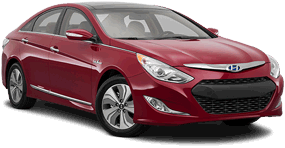Just looking at the past ten months of reviewing cars, we've driven a dozen EVs, whereas the previous year there were no more than five in the entire range of vehicles we drove. That's a big change, and everyone is talking about EVs. Neighbors, friends, relatives, co-workers. But not many people are actually buying them.

We've even advised people against buying an EV right now, instead steering folks towards hybrids or PHEVs, instead. This way, drivers get the benefit of efficiency and for PHEV owners, they can drive to and from work on electricity alone but don't have to freak out when they can't charge. The result is dismal forecasts and less-than-stellar sales. The huge plans automakers have made to turn their lineups into EVs are changing because the forecast isn't once what it was. It seems the hurdles toward EV adoption are very real. The stock of EVs on dealer lots isn't exactly moving quickly, and that's not good news.
Big Automakers are Finding Limitations to EVs

One of the biggest manufacturers of EVs, General Motors, is paring things back. Mary Barra, CEO of General Motors, now says they won't meet their goals of EV Production. GM is nixing its goal of building 100,000 EVs in the second half of 2023 and 400,000 in the first six months of next year. No new targets have been set, but it looks like GM has to seriously dial things back. Even the luxury division, Cadillac, will likely have to revisit its goal of having an all-electric lineup in the next few years. We'll see how this bodes for the very pricey ($300k+) Cadillac Celestiq luxury sedan that's supposed to start production next year.
At the recent GM earnings call, Barra stated that GM does not know when it might hit its previous targets, and it also did not specify what the new targets are. That does not bode well in an industry where so many manufacturers have gone whole hog on EVs, despite the fact that there are numerous adoption hurdles, namely the plagued charging infrastructure, EV prices, and that still very real range anxiety that seems to exist no matter how much range an EV actually has.

This past summer, Ford CEO Jim Farley did a cross-country road trip with his son in an F-150 Lightning ($49,950 MSRP), and he came face-to-face with the challenges of EV charging. We've driven the F-150 Lighting, and it is an impressive vehicle. But the fact remains that no matter how good an EV is, it can easily get handcuffed by charging issues and infrastructure sparseness when driving long distances. Farley realized that his product is only as good as its ability to find a fuel source quickly and easily.
No surprise charging can be a challenge, but still learning a lot seeing firsthand the issues our customers face. This is why we’re working w/ @Tesla to provide @Ford drivers access to +12,000 superchargers & our EV certified dealers are installing fast chargers at their… pic.twitter.com/fES15o9orT
— Jim Farley (@jimfarley98) August 13, 2023
Every time we get behind the wheel of an EV for a week, the first thing we wonder about is whether or not we'll be able to find an available and functioning charger. There is one Level 3 charger within quick driving distance from our home, but sometimes all of the bays are occupied, and those are the ones that actually work. Finding an available Level 2 charger near the office presents another challenge. Even if one is free, we have to park it there for about four hours to get anything resembling a significant charge. Honestly, we'd take gas over electric any day of the week.
The Prices Aren't Drawing in Buyers

Cars are expensive. Let's face it. Nobody wants to drop a ton of money on technology they're not fully comfortable with, especially if an EV is going to be their only vehicle. Currently, the least expensive EV is the Chevy Bolt at $27,495. That's well under the average new car price of around $50,000. There are several inexpensive options, but most of them are actually small vehicles. If you want to get into a sizable crossover or SUV, you have to get something like a Nissan Ariya ($44,555 MSRP), a Toyota BZ4X ($43,350 MSRP, or a Telsa Model Y ($43,990 MSRP). You can wait for the inexpensive and still premium Volvo EX30 ($34,495 MSRP), but that won't be released for sale until next summer.

Forget about EVs like the Mercedes Benz EQS SUV (photo above), which starts well above $80k. There are a slew of premium EVs that sell well, but the EQS is not one of them. The Porsche Taycan, Rivian R1T and R1S, and the Telsa Model X all do pretty well in the premium EV segment. More affordable EVs are actually dwindling in production since automakers like Honda and GM have killed plans to build them, instead aiming at vehicles like the Chevy Blazer EV ($51,80 MSRP) and the Honda Prologue ($41,800 MSRP).
Of course, we told you there were significant EV issues. At the end of the day, it seems to be painfully true that automakers severely overestimated the demand for EVs, and poor infrastructure planning made things even worse. We have to say we're not exactly shocked by the news that forecasts will be adjusted to accommodate for the poor sales. Automakers got a bit too excited and didn't realize adoption would be as much of a challenge as it has been.
EVs are getting better and better by the year. Here are some truly excellent ones.



